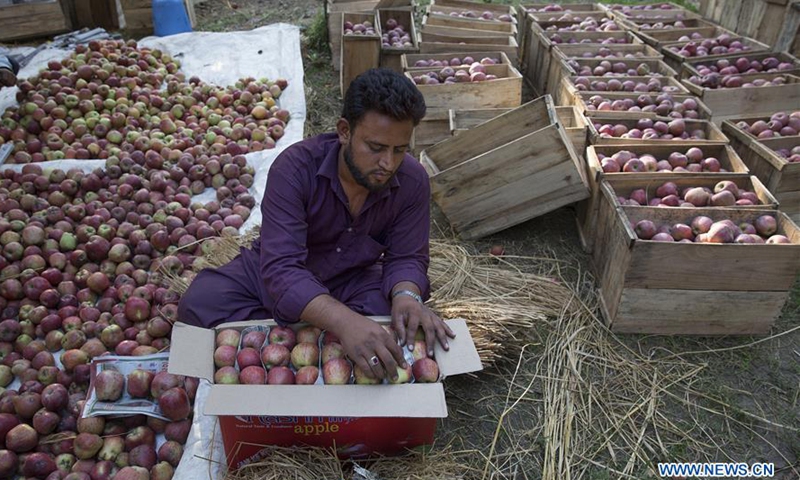India loses out on regional integration opportunity
By Chi Jingyi Source: Global Times Published: 2020/11/16 20:52:41

A labour packs freshly harvested apples in a box in an orchard at a village in Anantnag district, about 75 km south of Srinagar city, the summer capital of Indian-controlled Kashmir, Sept. 24, 2020. (Xinhua/Javed Dar)
The Regional Comprehensive Economic Partnership (RCEP), covering 15 Asia-Pacific countries and 2.2 billion people was signed on Sunday, but India opted out the talks last year.
Some analysts said India has lost the opportunity to embrace intra-regional closer integration of supply chains in the world's fastest-growing area.
The RCEP will promote economic integration of the Asia-Pacific region. As India chooses not to join in, it will regret it someday, as in the field of commodity trade, it will be gradually marginalized, Zhang Xiaorong, director of the Beijing-based Cutting-Edge Technology Research Institute, told the Global Times on Monday.
According to analysts, the RCEP will eliminate tariffs on at least 92 percent of goods while providing additional market access for exports.
As India stays out of the RCEP, its products will be replaced by those from RCEP member countries, said the analysts, and India is likely to lose part of the Chinese market too, one of the largest among RCEP members, in terms of exports of agricultural products, organic chemicals and raw materials.
In 2019, Indian exports of agricultural products and animal food and feed products to China increased to $2.33 billion, up 122 percent on a yearly basis, according to statistics from the Indian Embassy in China.
But agricultural trade between China and the Association of Southeast Asian Nations (ASEAN) -- all RCEP members, saw steady growth, which could further squeeze the market share of Indian products in China. For instance, China imported 66,000 tons of rice from Vietnam in the first two months of this year, up 595 percent from a year earlier.
It is crucial for India, which does not have as many irreplaceable products as it imagines, said an analyst.
"The vulnerability of India's domestic industries is one of the concerns in terms of not joining multilateral trade agreements, which will allow cheaper imported goods with higher quality to flow into the country," Bao Jianyun, director of the Center for International Political Economy Studies at Renmin University of China, told the Global Times on Monday.
Bao also said that India has a particularly complex relationship with the US, and the Modi government has become a major obstacle to resist RCEP. "The recent border friction between China and India, and the fact that China is the main promoter of the RCEP, exacerbated India's concerns about joining the RCEP," he added.
But Bai Wenxi, chief economist of IPG China, told the Global Times that India's economy relies less on foreign trade than China, Japan and South Korea. Thus, India may not have that much to lose by refusing to join RCEP.
Posted in: ECONOMY,BIZ FOCUS